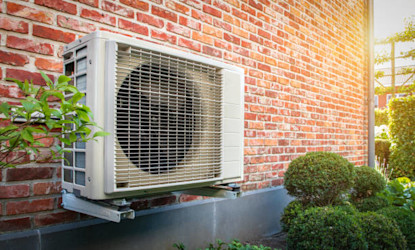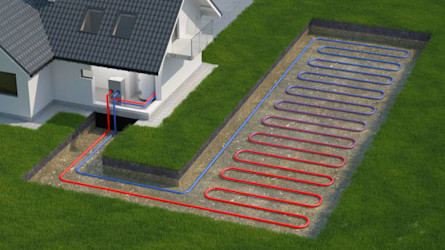All you need to know about Heat Pumps
A heat pump is a highly efficient and low-carbon heating system. Installing one could help lower your heating bills while also lowering your home's carbon emissions. Continue reading to learn about the benefits and drawbacks of installing a heat pump and to find out if they are a suitable option for heating your home
Last updated - 14/11/2022
Estimated reading time - 7 minutes
What is a heat pump?
A heat pump is a device that extracts energy from an outside source and transfers it into heat to be used to warm a property’s hot water and central heating.
A heating system like a boiler burns fuel or converts electricity into heat, whereas a heat pump doesn’t generate heat, it transfers it. Transferring heat from the outside into your home instead of generating it makes a heat pump more efficient than a boiler.
How does a heat pump work?
- Heat from an outside source, such as the ground, air, or water, is absorbed into the device and flows over a network of tubes filled with a refrigerant. As the refrigerant is at a lower temperature than the outside heat source, heat gets transferred to the liquid, and it evaporates into a gas.
- The gas then goes through a compressor, which increases the pressure. Compressing a gas adds more heat to it.
- Now that the gas has been compressed and further heated, it passes into a heat exchanger that is surrounded by cool air or water. The hot compressed gas heats up the cool air or water that surrounds the heat exchanger.
- The heated air or water gets circulated around your home to provide heating and hot water.
- The refrigerant condenses back into a cold liquid and the cycle starts again.
What heat pumps are available?
Air source heat pumps

Air source heat pumps are the most common type of air pump installed in the UK. An air source heat pump extracts heat from the air outside and transfers it to the water that heats a property’s radiators and/or underfloor heating. Air source heat pumps can also be used to heat water stored in a hot water cylinder, which can be used for your hot water taps and showers.
Air source heat pumps work best when there is less of a difference between the outside and indoor temperatures. This makes them a good choice for properties with underfloor heating because, as floors cover a much larger area than radiators, they do not need to get as hot to provide a home with the same amount of heat.
Ground source heat pumps

A ground source heat pump transfers heat from the ground outside a property to heat radiators, underfloor heating, and water for taps and showers.
A mixture of water and antifreeze is pumped around a loop of pipe that is buried in the garden or outside space. As the fluid circulates the underground pipes, it absorbs heat from the ground. This heat is then passed on to a refrigerant, which is then compressed to increase its temperature. The heat exchanger then extracts the heat and transfers it to the property’s central heating system.
Water source heat pumps
A water source heat pump uses heat from a source of water to heat a home’s central heating system. There are two main types of water source heat pumps: a closed loop system and an open loop system.
Closed loop systems are used in lakes or large ponds. In a closed loop system, pipes filled with water and antifreeze are submerged under water. As the fluid circulates through the submerged pipes, it absorbs heat from the water source and transfers the heat to the heat pump.
In an open loop system, water is taken directly from the water source to the heat pump. Once the heat has been removed from the water, the water is pumped back into the water source. Open loop systems are capable of circulating larger volumes of water than closed loop systems, which makes them more efficient than an equivalent ground or air source heat pump. Open loop systems do have a higher maintenance and operational cost, so you will need to factor this in when considering purchasing one.
How efficient are heat pumps?
Heat pumps are some of the most efficient heating systems available. This is because they generate much more energy than they use. The amount of heat generated for every unit of electricity used is known as the Coefficient of Performance (CoP). So, for example, if a heat pump has a CoP of 4, it means it will generate 4 units of heat for every one unit of electricity it uses, which will make it 300% efficient. To put this in context, the most efficient gas boilers on the market are around 94% efficient. This means that only 94% of the energy the boiler uses is turned into heat for your home, while the other 6% is wasted. A heat pump doesn’t waste any energy, it produces more energy than it uses.
Water source heat pumps are typically the most efficient out of all the heat pumps, with some being able to achieve a CoP of 6. Ground source heat pumps are usually the second most efficient type of heat pump with an average CoP of 4.5. Air source heat pumps are usually the least efficient, with an average CoP of 3.2.
Will a heat pump save me money on my heating bills?
Although a heat pump needs electricity to work, for every 1kWh of electricity they use, they produce on average 3kWh - 6kWh of heat. This makes them around 200% - 500% efficient.
The amount of electricity needed to run a heat pump depends on many factors, such as:
- The size of your home. The bigger the home, the harder a heat pump has to work to provide sufficient heat.
- How well insulated your home is. The less insulated your home is, the more heat it will lose, meaning that the heat pump will have to use more electricity to keep your home warm.
- The difference between the outside temperature and the required indoor temperature. The compressor in a heat pump has to work harder when the difference between how cold it is outside and how warm you want it to be inside your home increases.
- The design of your central heating system. If you have small radiators, the heat pump will have to run at a higher temperature to keep rooms warm. The harder a heat pump works, the more electricity it uses.
According to the Energy Saving Trust, a typical well-insulated four-bedroom detached house could save £870 on annual energy bills when replacing a G-rated gas boiler with an average ground source heat pump, or £145 when replacing an A-rated boiler.
What type of heat pump is right for my home?
Air source heat pumps are the most popular type of heat pump in the UK due to their suitability for most types of properties and their lower cost compared to other types of heat pumps. Air source heat pumps can be installed in a range of property types, small or large, urban or rural. To install an air source heat pump, all you will need is a place outside your home where it can be fitted to a wall or on the ground. The air source heat pump will have to have some space around it to allow good air flow to the unit.
As well as providing heat during the colder months, an air source heat pump can also be used as a cooling system when the weather gets warmer.
A ground source heat pump is best suited for properties that have a good amount of land surrounding their home. Your property will have to be large enough to install the ground loop. The ground loop is the network of pipes that pump water underground. It can be fitted horizontally or vertically. How the ground loop gets installed will depend on the space you have available.
Horizontal ground loops are laid in a shallow trench over a wider surface area. It is estimated that a 120 m² three-bedroom house would need two trenches around 30 to 40 metres long. Vertical ground loops are fitted in a borehole. Depending on the size of the system, the borehole may need to be between 15 and 100 metres deep.
If you want to install a water source heat pump, your home must be near a large enough water source. The more heat you need to generate, the larger the water source you will need to live near. There also must be enough space to lay pipes between your home and the water source. If you live in a town or city with no large lakes or rivers nearby, you should instead consider an air or ground source heat pump.
How well is your home insulated
To get the maximum heat and financial benefit from installing any type of heat pump, your home needs to be well insulated. Well insulated homes need less heat to stay warm. Heat pumps will not be able to keep a poorly insulated home as warm as a boiler would. This is because heat pumps circulate hot water to radiators and underfloor heating at temperatures around 35℃ - 55℃, depending on the outside temperature, whereas a boiler heats water to around 60℃ - 75℃.
Better insulation and installing larger radiators are recommended when installing a heat pump. Larger radiators can provide more heat at lower temperatures, and in turn, your chosen heat pump can run more effectively.
A heat pump installer will be able to access your radiators, as well as how well insulated your home is, and advise you on your options.
How much does a heat pump cost?
The price of a heat pump will vary depending on many factors, such as the size of the property, the type and size of heat pump you are installing, and the heat pump manufacturer.
Generally speaking, air source heat pumps are the cheapest type of heat pump and typically range from £7,000 to £15,000.
Ground and water source heat pumps can be bought and installed for around £15,000 to £25,000.
To offset the initial high purchase and installation costs of a heat pump, the UK government has introduced the Boiler Upgrade Scheme. The Boiler Upgrade Scheme (BUS) is a UK government initiative that provides grants of up to £6,000 to homeowners who install low-carbon heating systems such as heat pumps and biomass boilers.
To find out how you can apply for a £6,000 grant, click here.

